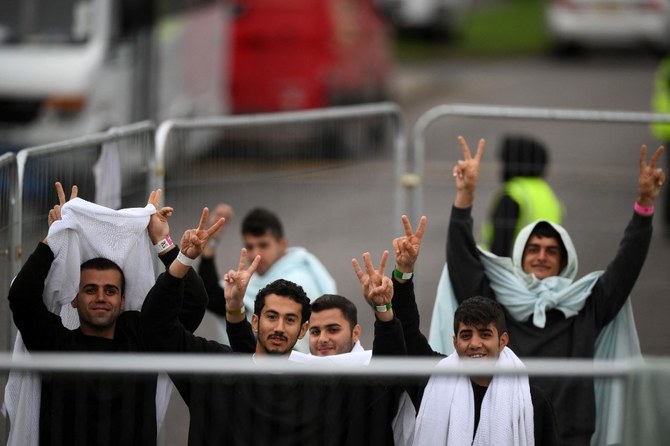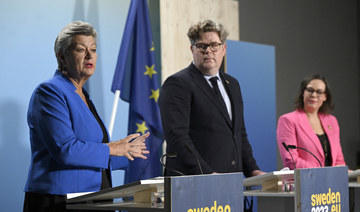London: A migrant processing center in England has seen people restrained to stop them from self-harming and fights break out over food, an investigation has found.
Liberty Investigates used freedom of information requests to look into conditions at the facility in Manston, a former military barracks, finding it housed almost 4,000 people in October 2022.
The Independent newspaper reported that Liberty found people had been locked in vans, pinned to the ground and beaten, and forcibly restrained after asking for more food, and that thousands had been forced to sleep in a makeshift marquee due to overcrowding.
In one incident, recorded by immigration officers and facility staff whenever force was used, a man was elbowed and had his legs restrained after he and several others began banging their heads on walls.
Lucy Moreton, a spokesperson for the ICU union representing Border Force staff, said poor conditions at the site had “contributed to the psychological state that leads to people self-harming,” and had also led to people “stealing food, rushing doors, (and engaging in) organized unrest.
“All of that comes from and is driven by being restrained in conditions which are not designed to meet basic human needs,” Moreton added.
The investigation also found evidence of fights breaking out between different groups of people divided by nationality and suggested that inadequate medical attention had been given to asylum-seekers in some instances because staff felt people were “faking” the severity of their conditions.
On Oct. 2, a staff member wrote in a report on one such case, which led to an asylum-seeker requiring hospitalization: “More care was given by (a detainee custody officer) than any medic on site…I got the feeling the medics thought he was faking the injury.”
Staff reported a “very tense” atmosphere at the site, and on Oct. 14 a man was physically restrained for his and others’ safety after becoming “irate” because he had not been given anything to eat, “shouting about the food and that he was not a dog.”
There were also numerous instances of people trying to break out of the Manston facility, with a report on Oct. 25 claiming “migrants were attempting to rush the doors” after a “sit-down protest outside the tent compound.”
Idel Hanley, policy manager at the charity Medical Justice, told The Independent: “Many people at Manston will have histories of torture and trauma. This information indicates a situation which was chaotic and frightening, with little accountability or liability.”
Concerns were also raised that many of the reports filed on force used had come from staff from one contracting firm, Mitie, and from Clandestine Threat Command officers, but that none had been submitted by employees of another private contractor, Interforce. This was despite evidence that their staff had restrained asylum-seekers and that the prisons inspectorate insisted all staff must “complete appropriate reports promptly and in detail” to “identify possible ill-treatment.”
The Prison Officers Association’s Andy Baxter told The Independent: “Interforce contract staff were brought on site very quickly in response to the rapid expansion of Manston, and the staff in parts of the facility did not have the correct level of training and interpersonal skills to recognise and defuse conflict situations.”
Moreton added that private contractors lack the legal powers of Home Office staff and could only act in self-defense or the defense of others.
“The Home Office was aware of serious concerns raised by staff and others about the length of time migrants were held for, and queries about the possible legality of that detention,” Moreton said. “Staff were being asked to perform public control functions, which are outside of their legal remit and their training. It was a very frightening time for all concerned.”
The UK received more than 45,000 asylum-seekers via the English Channel last year, with 1,200 making the trip in January 2023. Over 140,000 are currently awaiting decisions on their asylum applications and remain in temporary accommodation in hotels and other places, including sites like Manston, initially meant only to process new arrivals.
A Home Office spokesperson said: “We take the safety and welfare of those in our care extremely seriously. Significant improvements have been made to facilities at Manston in recent months, following unprecedented numbers of people crossing the Channel last autumn, and the site remains well-resourced for future arrivals.
“All on-site staff receive the relevant training required for their roles, and all operational activities are risk-assessed and subject to review.
“The Home Office ensures all its contractors employ people in accordance with their wider legal obligations, and we expect high standards from all of our providers and their staff to keep those in our care safe.”













